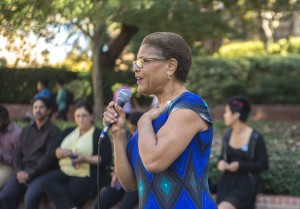With an 11-1-0 vote, the undergraduate student government passed a resolution Tuesday calling for students to learn more about a proposition in the upcoming midterm election that would lower criminal sentences for some nonviolent crimes.
“Proposition 47 is the solution we’ve been waiting for,” said Undergraduate Students Association Council President Devin Murphy. “This is incredibly important to the problems we’ve been working to solve.”
USAC Financial Support Commissioner Heather Rosen, the only councilmember to vote “no,” said she thinks the language of the resolution does not give students a balanced picture of the proposition and instead favors it.
The resolution followed a rally organized by Bruin Democrats Tuesday afternoon, in which Congresswoman Karen Bass and about 20 students called for the proposition to pass.
If successful, Proposition 47 would reduce the severity of sentences for certain crimes, such as a theft of goods less than $950 in value or the possession of drugs for personal use, making them misdemeanors. Current inmates would also be eligible for resentencing.

The proposition would also allocate savings from having smaller prison populations to fund mental health, victim services and truancy prevention programs. The state would save hundreds of millions of dollars annually if the proposition passes, according to the Legislative Analyst’s Office.
The proposition has been the main focus of students involved in the Invest in Graduation Not Incarceration, Transform Education campaign since the beginning of the school year. The University of California Student Association, which advocates for student issues on behalf of University students, launched IGNITE at the start of the previous school year.
Currently, the state spends roughly $10 billion on the correctional system each year, compared to about $45 billion on K-12 education. However, the average spending per person in prisons is much higher than the average spending per student. According to California Budget Project analysis of this year’s budget, the state is spending about $62,000 per prisoner, while spending about $9,000 per K-12 student.
“This is just the first step,” said Aret Frost, president of the Bruin Democrats. “We need to make our state representatives accountable to us, so they will shift our tax money from prisons to educations.”
Frost, a fourth-year political science student, said he thinks the proposition gives people a chance to avoid the stigma of being labeled a convict by changing some felony crimes to misdemeanors.
“We are giving people a chance to reinvest in society,” he said.
Neelum Arya, a research director at the UCLA School of Law, said she thinks the proposition will also keep sentencing consistent. Currently, some crimes can be considered either a misdemeanor or felony for arbitrary reasons, she said.
Arya added that she disagrees with concerns about lower crime sentences resulting from the proposition, since prosecutors can still file multiple charges against defendants.
“In the event a person is caught with a date rape drug and does intend to assault, someone will be charged with attempted assault,” she said.
Shayla McClelland, a fourth-year African-American Studies student, said she sees the proposition as a way to address racial inequities in the prison system, in which black and Hispanic individuals have a higher probability of being incarcerated than white individuals. According to a 2013 study from the Public Policy Institute of California, a nonpartisan think tank, black individuals are about eight times more likely to be in prison than white individuals.
“We are trying to set up a system where all people are being funneled into higher education, not prison,” she said.
Though there have been only a few polls, they show a favorable road for the proposition. According to a poll conducted last week by the Public Policy Institute of California, about 60 percent of likely voters polled said they would vote “yes” on the measure.
However, opponents, which include many law enforcement groups as well as victim advocacy groups, have said they think the proposition would endanger the community if it passes. Some UCLA students spoke out at the USAC meeting Tuesday, voicing their disagreement with the proposition.
John Lovell, a UCLA School of Law alumnus and lawyer for the California College and University Police Chiefs Association said he thinks the proposition will make people less inclined to go to drug treatment programs. Under the proposition, the possession of drugs for personal use will become a misdemeanor.
CCUPCA includes police departments from several UC campuses, though UCLA police is not part of it.
“If the penalty is only a misdemeanor and there’s no jail time, people won’t go to treatment,” Lovell said. “They’ll just plead guilty and walk away.”
Jacob Kohlhepp, external vice president of Bruin Republicans, said although the proposition may save some money to fund mental health programs, the state can find other ways to do so.
“(The state) can just stop a high-speed rail project,” said Kohlhepp, a third-year economics and political science student. “(The proposition) would theoretically save money, but there are other ways to save the money.”
The midterm election will be held Tuesday.
Contributing reports from Rafael Sands and Laurel Scott, Bruin contributors.
